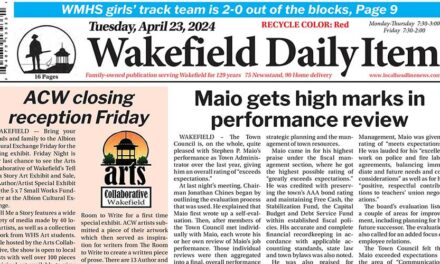Published in the February 3, 2017 edition.
By BOB KATZEN • Beacon Hill Roll Call
BOSTON — State Rep. Paul Brodeur of Melrose and state Sen. Jason Lewis of Winchester were among those who decided to override Gov. Charlie Baker’s veto of an $18 million pay raise package for lawmakers and others.
State Rep. Donald Wong, the Saugus Republican, voted not to override the governor’s veto.
Brodeur represents Wakefield precincts 4, 5 and 6 in the House. Wong represents precincts 1, 2, 3 and 7. Lewis represents the entire town in the Senate.
The House vote was 116-43, the Senate’s 31-9. The pay raise package includes hiking the salaries of the two leaders who filed the bill, House Speaker Robert DeLeo (D-Winthrop) and Senate President Stan Rosenberg (D-Amherst), by $45,000 from $97,547 to $142,547. The measure also hikes the pay of the Legislature’s two Republican leaders, Sen. Bruce Tarr (R-Gloucester) and Rep. Bradley Jones (R-North Reading) by $37,500 from $85,047 to $122,547. Another provision hikes the salaries of the state’s judges by $25,000 over an 18-month period.
The measure raises the governor’s salary by $33,200, from $151,800 to $185,000; and provides hikes for the other five constitutional officers. It also requires that every two years the salaries of the governor, the other five constitutional statewide officers and the House speaker and Senate president be increased or decreased based on data from the Bureau of Economic Analysis (BEA) that measures the quarterly change in salaries and wages. It also requires that the same formula be used every two years to increase or decrease the stipends that 99 other legislators receive for their service in Democratic or Republican leadership positions, as committee chairs or vice chairs and as the ranking Republican on some committees. There is a caveat in all these cases that the amount of money they receive can never be less than it is right now in February 2017.
“It is fiscally irresponsible and the process on it was inappropriate,” said Gov. Baker.
DeLeo defended the raises and noted two independent commissions had recommended many of the hikes. “Raises of any type are always the subject of disagreement … I don’t think there’s ever a tight time or right place,” he said.
“Congratulations taxpayers, you now have the highest paid House speaker and Senate president of any state legislature in the nation,” said Chip Ford, executive director of Citizens for limited Taxation. “The Best Legislature Money Can Buy has struck again to make Massachusetts Number One.”
“My standard for judging these things is this: Are we paying a salary adequate enough to enable a family breadwinner or a professional to run for the office?” asked Sen. Mike Barrett (D-Lexington).”This will be the first pay raise in recent memory big enough to draw the interest of people employed in the private sector today. Any resulting competition will be good for the system.”
The measure puts an end to legislative per diems which are travel, meals and lodging reimbursements collected by the legislators. These reimbursements are given to legislators above and beyond their regular salaries.
Another provision increases the annual general expense allowance for each legislator from $7,200 to $15,000 for members whose districts are within a 50-mile radius of the Statehouse and to $20,000 for districts located outside of that radius. This allowance is used at the discretion of individual legislators to support a variety of costs including the renting of a district office, contributions to local civic groups and the printing and mailing of newsletters. Legislators are issued a 1099 from the state and are required to report the allowance as income but are not required to submit an accounting of how they spend it.
The package also gives a $65,000 housing allowance for the governor. Massachusetts is one of only six states that supplies neither a governor’s residence nor a housing allowance, even as Boston has the among the most expensive housing market of any of the state capitals.
The House and Senate attached an emergency preamble to the measure. That means it goes into effect immediately instead of in the usual 90 days. The preamble says, “Whereas, the deferred operation of this act would tend to defeat its purpose, which is to make certain changes in law for compensation of public officials, therefore, it is hereby declared to be an emergency law, necessary for the immediate preservation of the public convenience.”
Voters are not allowed to collect signatures to put a question repealing the pay raises on the November 2018 ballot because the package includes judicial pay hikes which under the Massachusetts Constitution cannot be the subject of a repeal on the ballot.




